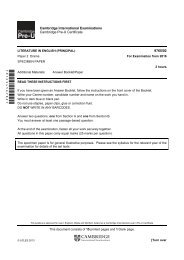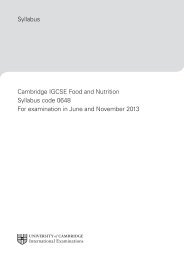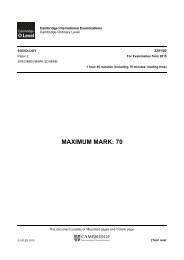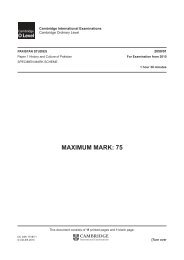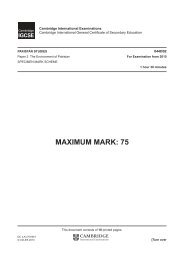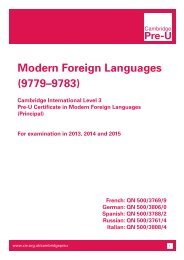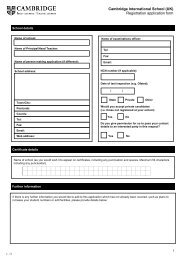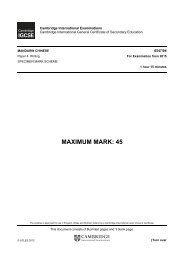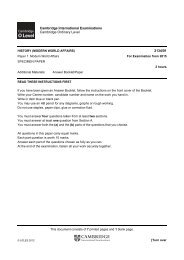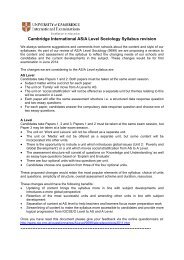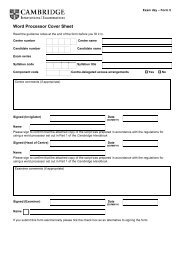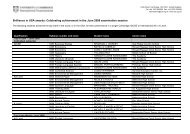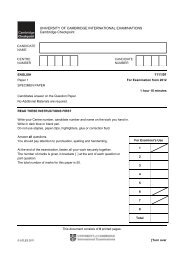Teacher's Guide Cambridge Pre-U MUSIC Available for teaching ...
Teacher's Guide Cambridge Pre-U MUSIC Available for teaching ...
Teacher's Guide Cambridge Pre-U MUSIC Available for teaching ...
You also want an ePaper? Increase the reach of your titles
YUMPU automatically turns print PDFs into web optimized ePapers that Google loves.
16<br />
<strong>Cambridge</strong> <strong>Pre</strong>-U Teacher <strong>Guide</strong><br />
Mahler was by no means the first composer, however, to write music that had an overtly serious<br />
purpose. From the time of Beethoven’s Heiligenstadt Testament composers had tended to see their<br />
music (and the symphony in particular) as a vehicle <strong>for</strong> the expression of their most important<br />
statements. This is entirely consistent with the prevailing Romantic view of the artist as a person<br />
with special gifts that enabled him to make a significant commentary on the most profound<br />
aspects of life itself – a characteristic that can be observed not only in music but in all the arts of the<br />
nineteenth century. Serious music was no longer confined to the intellectual circles of the wealthy<br />
and privileged: instead of working <strong>for</strong> aristocratic patrons, composers increasingly worked <strong>for</strong><br />
themselves, depending <strong>for</strong> their livelihood on the per<strong>for</strong>mance and publication of their work. This<br />
led to an increasing individuality of style, coupled with a need to respond to the concerns of society,<br />
represented by a paying audience – whether it was made up of those who attended public concerts<br />
or of those who played music at home <strong>for</strong> their own pleasure. Some, at least, of the chamber music<br />
composed during the nineteenth century was directed at a market <strong>for</strong> domestic music, often (but by<br />
no means exclusively) centred around the piano. Nevertheless, the technical virtuosity required by<br />
several chamber works indicates that public per<strong>for</strong>mance of such music by professional players was<br />
also common.<br />
Topic B2: Vocal Music<br />
This topic embraces three main areas of repertoire: opera, choral music and song. The length of<br />
many individual works (especially operas and oratorios), and the quantity of music composed during<br />
the period in question, dictates that teachers must be equally selective here in the music they choose<br />
to study. In the examination, questions will not be asked about works composed after 1900, despite<br />
the rather artificial nature of that date as a cut-off point.<br />
1 Opera<br />
The repertoire of nineteenth-century opera is very extensive and the composers concerned took a<br />
wide range of different approaches. Some of the composers were of great historical importance<br />
and had a significant influence, but their work has fallen out of the repertoire because of changing<br />
fashions, increasing costs or other similar factors. As a result it is often difficult to find accurate<br />
or complete in<strong>for</strong>mation without a great deal of time-consuming research and extensive reading.<br />
For that reason, this section of the Teacher <strong>Guide</strong> attempts to provide a substantial amount of<br />
background as well as providing an extensive list of composers and repertoire. It should be stressed<br />
that candidates preparing <strong>for</strong> the examination do not need to know more than a small fraction of<br />
the music that is mentioned below. The background in<strong>for</strong>mation may, however, clarify a number<br />
of issues that are often confusing, besides providing some of the context that is necessary <strong>for</strong> a<br />
developed understanding of this genre during a century when its history was unusually complicated.<br />
Nineteenth-century opera is perhaps best studied country by country. Although certain trends can be<br />
observed in all nineteenth-century opera, wherever it was written, the main national styles tended to<br />
be relatively discrete. The principal styles and composers include the following:<br />
www.cie.org.uk/cambridgepreu



